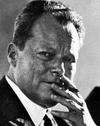- Brandt, Willy
-
born Dec. 18, 1913, Lübeck, Ger.died Oct. 8/9, 1992, Unkel, near BonnGerman statesman.As a young Social Democrat, he fled to Norway to avoid arrest after the rise of the Nazis in the 1930s. There he assumed the name Willy Brandt and worked as a journalist. Returning to Germany after World War II, he was elected to parliament in 1949 and became mayor of West Berlin (1957–66), a post in which he achieved world fame. He led a coalition government as chancellor of the Federal Republic of Germany (1969–74). As chancellor, he improved relations with East Germany, other communist nations in eastern Europe, and the Soviet Union and helped strengthen the European Economic Community. For these efforts he received the Nobel Prize for Peace in 1971. He remained the leader of the Social Democratic Party until 1987.
 Willy Brandt.Authenticated News International
Willy Brandt.Authenticated News International* * *
▪ German statesmanoriginal name Herbert Ernst Karl Frahmborn December 18, 1913, Lübeck, Germanydied October 8/9, 1992, Unkel, near BonnGerman statesman, leader of the German Social Democratic Party of Germany (Sozialdemokratische Partei Deutschlands, or SPD) from 1964 to 1987, and chancellor of the Federal Republic of Germany from 1969 to 1974. He was awarded the Nobel Prize for Peace in 1971 for his efforts to achieve reconciliation between West Germany and the countries of the Soviet bloc.Brandt passed his university entrance examination in 1932. A year later, however, when the Nazis came to power, his activities as a young Social Democrat brought him into conflict with the Gestapo, and he was forced to flee the country to escape arrest. It was at this time, while living in Norway and earning a living as a journalist, that he assumed the name Willy Brandt. When the Germans occupied Norway he escaped to Sweden, where he remained for the duration of World War II. After the war he returned to Germany as a Norwegian citizen and for a time was press attaché at the Norwegian mission in Berlin.Pressed to return to politics, he became a German citizen again and, after a period as Berlin representative of the Social Democratic Party Executive Committee, was elected a member of the federal parliament in 1949. Eight years later he became the mayor of West Berlin (1957–66), a post in which he achieved world fame. He showed great moral courage when in 1958 the Soviet Union demanded that West Berlin be given the title of a demilitarized free city and especially when the Berlin Wall was built in 1961. He succeeded Erich Ollenhauer as chairman of the SPD in 1964 and campaigned for the office of chancellor of West Germany three times—in 1961, 1965, and 1969.When the grand coalition government of the Christian Democratic Union (CDU) and the SPD was formed in 1966, Brandt became foreign minister and vice-chancellor. His party improved its performance at the federal election in 1969 and formed a coalition government with the small Free Democratic Party, pushing the CDU into the role of opposition party for the first time. His government's first major decisions included the revaluing of the West German mark and the signing of the Nuclear Non-proliferation Treaty (Non-proliferation of Nuclear Weapons, Treaty on the).The year following his election as chancellor, Brandt concentrated on foreign affairs, and he particularly sought to improve relations with East Germany, other communist countries in eastern Europe, and the Soviet Union, formulating a policy known as Ostpolitik (“eastern policy”). His efforts led to a treaty with the Soviet Union in August 1970 calling for mutual renunciation of force and the acceptance of current European borders; to a nonaggression treaty with Poland in December 1970 recognizing the Oder-Neisse Line (Oder–Neisse Line) as Poland's western boundary; and to the Big Four agreement in September 1971 on the status of Berlin. His treaty with Poland was controversial; detractors claimed that it signaled West Germany's acceptance of the permanent loss of those eastern lands stripped from Germany after World War II, while supporters praised it for opening the possibility of reuniting West and East Germany and stabilizing relations with eastern Europe. A firm supporter of a united Europe, Brandt exerted his influence to break down French objections to enlarging the European Economic Community (European Community) (EEC). More than any other statesman he helped promote the entry of Britain and other countries to the EEC.Brandt resigned in May 1974 after his close aide Gunther Guillaume was unmasked as an East German spy. He remained the chairman of the SPD until 1987 and was also head of the Socialist International (the Social Democrats' umbrella organization) from 1976 to 1992. From 1979 he also headed the Independent Commission on International Development Issues, known as the Brandt Commission, a prestigious independent panel that studied world economic policies.Brandt received the Nobel Prize for Peace in 1971 for his continuing work toward reconciliation between West Germany and East Germany, Poland, and the Soviet Union. He wrote several books, including Willy Brandt in Exile: Essays, Reflections and Letters, 1933–1947, translated from the German by R.W. Last (1971), and People and Politics: The Years 1960–1975, translated by J.M. Brownjohn (1978). The latter comprises Brandt's political memoirs.Additional ReadingStudies of Brandt's life and career include Barbara Marshall, Willy Brandt (1997); David Binder, The Other German: Willy Brandt's Life & Times (1975); Viola Herms Drath, Willy Brandt, Prisoner of His Past (1975); and Terence Prittie, Willy Brandt: Portrait of a Statesman (1974).* * *
Universalium. 2010.
